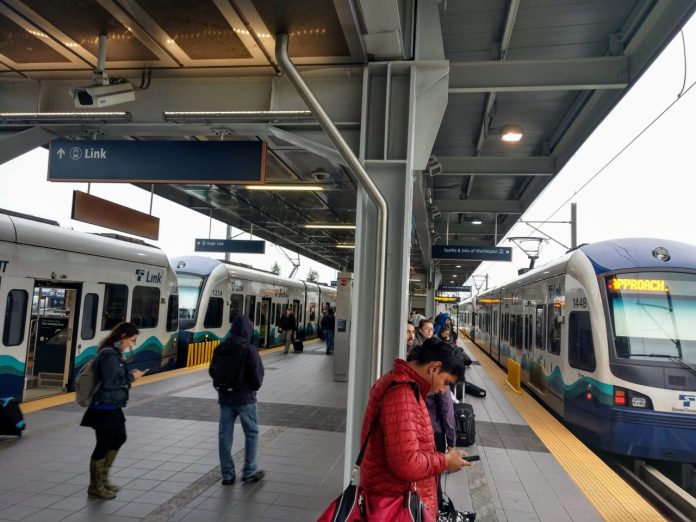
On Friday, a chorus of Democrats joined Representative Mike Pellicciotti (D-Federal Way) to file a bill reducing funding for Sound Transit 3. House Bill 2123 will be introduced Monday and would primarily lower the car tab fees for cars newer than 10 years old and registered within the Sound Transit service area. Representative Pellicciotti made a run at a similar bill last year to strip transit expansion funding from Sound Transit. The bill will result in billions of dollars vanishing from the Sound Transit 3 financial plan beginning in 2020, meaning that light rail, commuter rail, and bus rapid transit expansions could be cut or delayed.
Last year, Democrats operated under a false premise that they would pay dearly at the ballot box in the November election if they did not pass a bill to reduce car tab fees. The prevailing thinking had been there would be a voter backlash hitting suburban Democrats. That turned out to be very wrong, as some (like us) argued.
Instead, Democrats throughout the Sound Transit service area saw their numbers buoy, taking near total control of districts covered by the Sound Transit service area and seeing stronger performances where they already held control. Car tab fees were not a motivating force swinging voters against Democrats at the ballot box. In fact, results suggests most people riled up about car tab fees are people who never would have voted for Democrats or Sound Transit 3 in the first place. In other words, the typical right-wing, anti-tax voter.
Nevertheless, Democrats appear slated to make a repeat at trying to cut and delay voter-approved transit with no identified funding sources to replace lost revenue that a “market value adjustment program” would create. Language in the bill directs Sound Transit to implement cost-saving strategies as if the transit agency already does not use such principles. The language is hollow and patronizing. But going further, it directs the transit agency to make cuts from non-light rail and non-bus rapid transit projects first and then explicitly prohibits elimination of light rail and bus rapid transit projects. The language could damage Sound Transit’s efforts to build affordable housing near its stations as part of its equitable transit-oriented development program.
It is possible that Democrats have expanded their past logic of “if we don’t do something, we’ll pay at the ballot box” to Tim Eyman’s initiative that would cut car tab fees for Sound Transit. That initiative is almost certainly to appear on the November ballot. But if last year is anything to judge by, reducing car tab fees for Maserati, BMW, and Bugatti car owners is not likely to sway many votes to oppose the initiative than people already likely to vote against an initiative that would strip transportation options all across the state.
Adding to the irony of this all is that Senate Democrats have introduced a new transportation package that would add new car tab fees, a six cent gas tax increase, and a $15 per ton carbon fee to bankroll it. The $16.1 billion transportation spending package would commit the state to extensive highway building projects over the next 10 years, but provide very little money to non-highway projects. In fact, less than 6.1% of funding would go to transit or walking, rolling, and biking projects (this excludes Washington State Ferries investments, which are primarily geared toward cars). Virtually none of this would backfill lost revenues to Sound Transit.
In short, Democrats appear to be making a bait and switch: take from transit and give to highways. And this is in the midst of a climate crisis and serious need to provide more congestion-free transportation options quickly. Democrats could choose to deal with this responsibility by putting people first and finally funding public transit investments at the state level and speeding them up. The cowardice in these bills, however, suggests they are not prepared to do any of that.
Several Seattle Representatives have co-sponsored the bill to cut Sound Transit 3 funding, including: Eric Pettigrew, Gerry Pollet, Cindy Ryu, Tina Orwall, Lauren Davis, Zach Hudgins, Sharon Tomiko-Santos, and Javier Valdez. Other King County Representatives include: Tana Senn, Debra Entenman, Roger Goodman, Steve Bergquist, Vandana Slatter, Larry Springer, Derek Stanford, Pat Sullivan, Amy Walen, My-Linh Thai, Lisa Callan, and Bill Ramos.
The bill is on an expedited process to beat self-imposed legislative deadlines. It is scheduled for a public hearing in the House Transportation Committee on Tuesday and possible executive session on Thursday, meaning it could get out committee in a matter of three days.
Let legislators know that this bill must be blocked, especially if Democrats cannot fully backfill the funding that they will be taking from Sound Transit. Urge co-sponsors to stand with transit and remove their names from this bill before the end of the day Monday. It also may be worth pressuring Representative Jake Fey, chair of the House Transportation Committee, to block a hearing on the bill altogether. We have launched an easy-to-sign online petition to urge legislators to block the bill.
Stephen is a professional urban planner in Puget Sound with a passion for sustainable, livable, and diverse cities. He is especially interested in how policies, regulations, and programs can promote positive outcomes for communities. With stints in great cities like Bellingham and Cork, Stephen currently lives in Seattle. He primarily covers land use and transportation issues and has been with The Urbanist since 2014.

